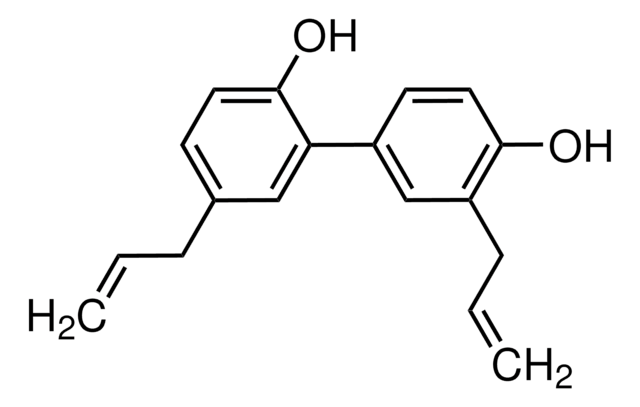P0020
Pristimerin
Synonym(s):
(9b,13a,14b,20a)-3-Hydroxy-9,13-dimethyl-2-oxo-24,25,26 -trinoroleana-1(10),3,5,7-tertraen-29-oic acid methyl ester, Celastrol methyl ester
About This Item
Recommended Products
Assay
≥98% (HPLC)
form
powder
storage condition
protect from light
color
orange
solubility
DMSO: ≥5 mg/mL
storage temp.
−20°C
SMILES string
COC(=O)[C@]1(C)CC[C@]2(C)CC[C@]3(C)C4=CC=C5C(C)=C(O)C(=O)C=C5[C@]4(C)CC[C@@]3(C)C2C1
InChI
1S/C30H40O4/c1-18-19-8-9-22-28(4,20(19)16-21(31)24(18)32)13-15-30(6)23-17-27(3,25(33)34-7)11-10-26(23,2)12-14-29(22,30)5/h8-9,16,23,32H,10-15,17H2,1-7H3/t23-,26-,27-,28+,29-,30+/m1/s1
InChI key
JFACETXYABVHFD-WXPPGMDDSA-N
Looking for similar products? Visit Product Comparison Guide
Application
Biochem/physiol Actions
Features and Benefits
Storage Class Code
11 - Combustible Solids
Flash Point(F)
Not applicable
Flash Point(C)
Not applicable
Certificates of Analysis (COA)
Search for Certificates of Analysis (COA) by entering the products Lot/Batch Number. Lot and Batch Numbers can be found on a product’s label following the words ‘Lot’ or ‘Batch’.
Already Own This Product?
Find documentation for the products that you have recently purchased in the Document Library.
Articles
We offer many products related to cannabinoid receptors for your research needs.
We offer many products related to cannabinoid receptors for your research needs.
We offer many products related to cannabinoid receptors for your research needs.
We offer many products related to cannabinoid receptors for your research needs.
Our team of scientists has experience in all areas of research including Life Science, Material Science, Chemical Synthesis, Chromatography, Analytical and many others.
Contact Technical Service







